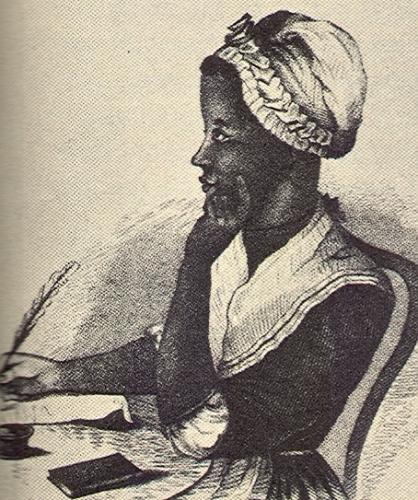 |
LITR 4231 Early American
Literature Sample Research Posts 2014 (research post assignment) Research Post 2 |
 |
Dawn Iven
16 April 2014
Abigail Adams:
A Woman Ahead of Her Time
When Dr. White introduced our
class to the letters written between Abigail Adams, and her husband, John Adams,
the second president of the United States, I was intrigued.
The conversation in their letters showed the love and trust they had for
each other. I was in awe of how
honest Abigail was in sharing her true thoughts and feelings with her husband in
a time when women did not have a say in much of anything.
I found the letter to her husband persuading him for political change in
women’s rights to be inspiring. I
wanted to find out more about the woman who was not afraid to get involved with
politics or voice her opinions on issues concerning women’s rights.
Abigail Adams was an extraordinary woman who loved her husband, her family, and
her country with a tremendous passion, and was destined for a life within the
political world. I believe the influence of her father and grandfather and the
respect, and encouragement from her husband allowed her to be outspoken
throughout her life on political issues that she was passionate about.
She was born into a politically influential family as well as marrying a
man with political aspirations. She
was born in 1744, a time when a woman’s involvement in politics was
inconceivable. Her father, a
minister in the Congregational Church, had a huge influence on her and taught her
the importance of reason and morality.
Additionally, her mother came from the politically influential Quincy
family in Massachusetts and is most likely where Abigail got her first
introduction to politics. She spent
many hours in the extensive libraries of her father and grandfather where she
fell in love with the great literary authors and cultivated an interest in the
subjects of philosophy, theology, history, government, and law, (http://www.firstladies.org/biographies/firstladies.aspx?biography=2).
John Adams found himself drawn to
Abigail because of her wit and intelligence, and possibly her family’s political
connections. After John and Abigail
were married, they made their home at Braintree on John’s small farm.
Within the next thirteen years, they had six children, with their son,
John Quincy Adams, later becoming the sixth President of the United States.
While John pursued his work, along with his role in forming our country,
Abigail educated the children and ran the farm alone.
Furthermore, because of John’s frequent absences they began communicating
through written letters.
In 1775, Abigail Adams took the first of
many steps into the world of politics, which she would continue throughout the
rest of her life. The Massachusetts
Colony General Court appointed her, along with Mercy Warren and Hannah Winthrop,
to question women who were charged with being loyal to the British crown, and
against the colony’s independence.
In a letter to Abigail, John wrote, “…you are now a politician and now elected
into an important office…,” (National First Ladies Library).
Abigail, a proponent for the rights of women, wrote urging her husband
for change in the status of women’s rights while he served as a delegate for the
Continental Congress. Her “Remember
the Ladies” letter is one of the “earliest known writings calling for women’s
equal rights” (National First Ladies Library). Although she was not able to
persuade him to make any changes, he teasingly responded to her letter saying,
"This is rather too coarse a compliment, but you are so saucy, I won't blot it
out” (http://coursesite.uhcl.edu/HSH/Whitec/texts/AmClassics/founders/Adamsltrsdec.htm).
Abigail found herself thrust further into the political world after her
husband’s appointment to the Vice Presidency.
Abigail stayed in the political spotlight by hosting dinners and
receptions with the President’s wife.
However, in 1791, suffering from “poor health,” Abigail returned home
(http://www.whitehouse.gov/about/first-ladies/abigailadams).
When John was elected President, Abigail knew their lives would change
forever, and although she loved being in the middle of the political stage, she
came to realize how the political world was full of “envy, hate, malice and all
uncharitableness” in every part of the government (National First Ladies
Library). She was unable to attend
her husband’s inauguration because she was caring for his dying mother, but the
newly elected President desperately wanted his wife, at his side.
He wrote begging her to join him: “I never wanted your Advice and
assistance more in my life” (National First Ladies Library).
She traveled to Philadelphia each year, and then, to the new capital in
Washington D.C. in 1800 to fulfill her obligations as First Lady.
As the new First Lady, Abigail was now completely in the political spotlight.
She kept a rigorous schedule, getting up as the sun rose to care for her
family; in the early afternoon, she received guests, presided over public
ceremonies, and helped the poor.
One evening a week she hosted a large dinner for guests that included
congressmen, diplomats, and other important citizens.
Abigail known as “Mrs. President,” by her husband’s rivals, was dubbed
“Lady Adams by those close to her as she took an even more active role in
politics through the support of her husband, therefore, becoming a popular
“target for attack” (Miller Center).
As First Lady, Abigail thrived in the political world.
She continued writing letters, not only to her husband, but also to other
influential people such as Thomas Jefferson and Mercy Otis Warren, among
others, letting her political opinions and thoughts be heard.
One of the infantry volunteer regiments organized under the name “Lady
Adams Rangers,” and once on her way to Massachusetts, she took it upon herself
to stop at an army camp to inspect the troops.
She wrote to her husband “I acted as your proxy” (National First Ladies
Library). In the year 1798, Mrs.
Adams became seriously ill, and although there was no absolute diagnosis, many
believed it was a stress-related breakdown.
Although Abigail
flourished in the political world, she was happy when her husband did not win a
second term. She was relieved to be
returning to their home in the country, and the family, and friends they loved.
She wrote in a letter “she was sick, sick, sick of public life” (National
First Ladies Library). John and
Abigail were, for the first time in many years, able to live together without
any distance between them. She
remained interested in politics and even made a gesture to renew a severed
relationship with President Thomas Jefferson after the death of his daughter,
Maria Jefferson Eppes. In 1818,
Abigail Adams died after having a stroke.
She was an extremely intelligent woman who found her place in a world
where only a very few women were allowed.
She was not afraid to speak her mind or voice her opinions publicly.
Abigail Adams was bold in her beliefs and fought hard for what she believed.
She was one of the first women documented taking a stand for women’s
rights. Having a relationship rare
to the era, she was not just a wife to John Adams, but she was also his partner
and confidant. The letters written
between Abigail and John show what an amazing, loving, and respectful
relationship they shared. The
letters she wrote are her “legacy” and are “an important record of the
Revolutionary era and beyond” (American History Central).
Through my research, I was able to find out more about this incredible
woman, Abigail Adams, and the extraordinary contributions she made in the early
years of the political world.
Works
Cited
http://americanhistorycentral.com/entry.php?rec=460
http://www.biography.com/people/abigail-adams-9175670#awesm=~oARfMjofbHl3Hn
http://coursesite.uhcl.edu/HSH/Whitec/texts/AmClassics/founders/Adamsltrsdec.htm
http://www.firstladies.org/biographies/firstladies.aspx?biography=2
http://www.john-adams-heritage.com/facts-abigail-adams/
http://millercenter.org/president/adams/essays/firstlady/abigail
http://www.whitehouse.gov/about/first-ladies/abigailadams
|
|
|
|

